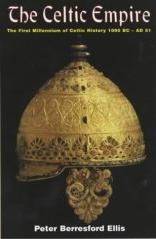
The Celtic Empire
Peter Berresford Ellis
246 pages including index
published in 1990
This was a bit of a disappointment. The full title of this book reads The Celtic Empire: the First Millennium of Celtic History 1000 BC - 51 AD and I picked it up thinking I would get a full overview of Celtic history, up until the final subjugation of the Celts by the Romans. However, most of the promised history is skipped over in favour of telling the last part of the Celtic story, of how Rome conquered the various Celtic tribes in Italy, Gaul, Spain, Asia Minor, Britain, etc. An interesting story in its own right, but not what I expected.
More disappointingly, this story was told, more often than not, not through Celtic eyes, but from a Roman or a Carthegenian or other point of view, in a context that's almost exclusively that of Roman history. So not only do you not get the entire Celtic history as the title promises, but the history it does tell of the Celts is somewhat fragmented, shown only where it impacted on the expansion of Rome.
Part of this is explained by the simple fact that most of what we historically know of the Celts, has come to us through the writings of their enemies. The Celts themselves were not a literary people the way the Greeks or Romans were, but operated from an oral tradition, supposedly distrusting writing out of a desire to keep their secrets to themselves. Where we do have examples of Celtic writing, they're mostly in foreign languages. This of course makes it much more difficult to reconstruct their history than it does to reconstruct that of other peoples. Much of their history is hidden from view, only being recorded when they came into contact with others, who of course will record these contacts from their own point of view.
But this handicap could've been at least partially overcome, had Berresford Ellis been of a more archaeological mind. Archaeology is not capable of revealing the entire history of a illiterate people, but it can help in establishing where and when they lived, how they lived, when they arrived and so on. Then again, The Celtic Empire doesn't really look at Celtic culture and way of life anyway, so perhaps archaeology won't help here.
What remains is a book that mainly tells how the Celtic world came to an end when Rome conquered it. Berresford Ellis tells it in a roughly chronical order, starting with the Roman conquest of Celtic Italy, Iberia and the Celtic participation in the Punic Wars, through the Celtic invasions of Thrace, Greece and Asia Minor, back to Gaul via North Africa, culminating in the Roman invasions of Britain. He tells it well, keeping your attention, but the whole of the book is somewhat less than its parts, because it fails to integrate these individual stories into a greater narrative. Interesting, but too flawed to recommend.
Read more about:
Peter Berresford Ellis,
The Celtic Empire,
history,
book review